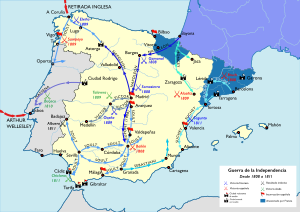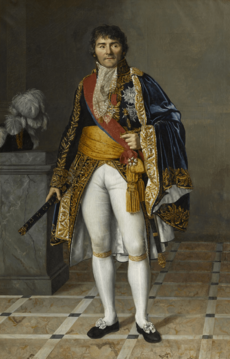Battle of Zornoza facts for kids
Quick facts for kids Battle of Zornoza |
|||||||
|---|---|---|---|---|---|---|---|
| Part of the Peninsular War | |||||||
 Movements of the French troops in Spain during the first stages of the Peninsular War (in Spanish) |
|||||||
|
|||||||
| Belligerents | |||||||
| Commanders and leaders | |||||||
| Strength | |||||||
| 21,000 | 19,000 | ||||||
| Casualties and losses | |||||||
| 200-300 | 600-1,000 | ||||||
The Battle of Zornoza happened on October 31, 1808. It was one of the first big fights in Napoleon's plan to take over Spain. The French army wanted to surround and defeat the Spanish forces. Even though the Spanish soldiers were pushed back quickly, they managed to escape in good order.
Contents
Why the Battle Happened
Spain Fights Back
In May 1808, the people of Spain rose up against French rule. This event is known as the Dos de Mayo Uprising. It marked the start of the Peninsular War. The Spanish army began fighting the French in battles like El Bruch in June 1808. A big moment was the Battle of Bailén in July 1808. This was the first time a Napoleonic army was defeated in an open battle.
British Help Arrives
Later, British forces joined the fight. Their first battle was at Roliça in August 1808. Then, Napoleon himself came to Spain to lead his army. The Battle of Zornoza was one of the first times Napoleon's forces, led by Marshal Lefebvre, faced the Spanish army under General Joaquín Blake.
French Plans and Spanish Challenges
Napoleon had a detailed plan to defeat Blake's army. He wanted to break the Spanish front line, which stretched across Spain. However, the Spanish forces faced many problems. There were disagreements among Spanish leaders and a lack of teamwork. General Blake didn't feel confident about his army's position. He could only try to advance carefully towards Bilbao.
Who Fought in the Battle
French Forces
The French army was led by Marshal François Joseph Lefebvre. His IV Corps had about 21,000 soldiers and 36 cannons. It included three main groups of infantry (foot soldiers). These groups were led by Major-Generals Horace Sébastiani, Leval, and Eugene-Casimir Villatte. They had soldiers from France, the Netherlands, Nassau, Baden, and Hesse-Darmstadt.
Spanish Forces
The Spanish army, called the Army of Galicia, was led by General Joaquín Blake. He had about 19,000 soldiers. His army was divided into three infantry divisions, a vanguard (front guard), and a reserve (backup). These divisions were commanded by Generals Figueroa, Riquelme, Carbajal, Mendizabal, and Mahy. Only six of Blake's cannons were used in the battle.
The Battle of Zornoza
On October 31, 1808, Marshal François Lefebvre attacked General Blake's Army of Galicia. Lefebvre attacked too early, going against Napoleon's orders. Blake was surprised by the French attack. He quickly moved his troops and cannons to retreat.
The Spanish foot soldiers fought without the help of their cannons. They were pushed back quickly by the French. However, they managed to retreat in an organized way. This meant the French failed to surround or completely destroy Blake's army. This made both Napoleon and the French leaders unhappy.
What Happened After
Casualties and Retreat
The French army lost about 200 soldiers. The Spanish army lost between 600 and 1,000 soldiers. Even though the French won the battle itself, it was a mistake for them in the bigger picture. Blake's army escaped the French trap. He led a clever retreat, even stopping his pursuers at the Battle of Valmaseda. The French couldn't catch him until November 10.
Napoleon's Advance
However, Napoleon's main army, called the Grande Armée, was very strong. Its huge size allowed the French to push past the weak Spanish defenses. By the end of 1808, the French managed to capture Madrid, the capital of Spain.
The French invasion of Spain continued with the Battle of Valmaseda.
See also
 | Lonnie Johnson |
 | Granville Woods |
 | Lewis Howard Latimer |
 | James West |


